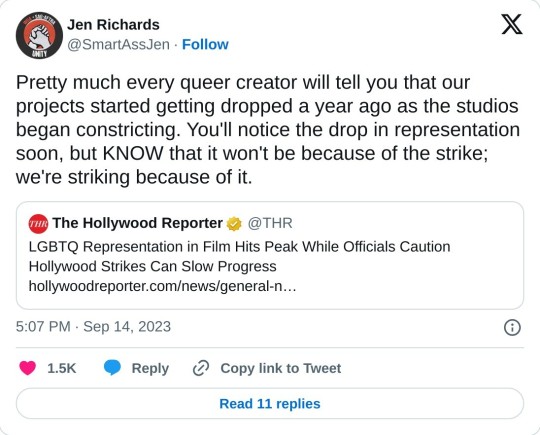#workers rights
Explore tagged Tumblr posts
Text

VOTE BLUE!
EDIT: This post is gaining traction, so I think it's important to show you this:
ELON IS INTERFERING WITH THE ELECTION. PLEASE CHECK YOUR VOTER'S REGISTRATION IN PERSON AND TELL PEOPLE ABOUT THIS.
EDIT 2:
IT HAS GOTTEN WORSE.
Please go check your voter's registration and tell everyone you know to do the same! I've heard some states are purging voter's regitration, so please go check!
#project 2025#vote blue#workers rights#fuck trump#maga morons#politics#vote democrat#us politics#usa#donald trump#blue collar worker#fuck elongated muskrat#elon musk#elongated muskrat#elon mask#elongated man#november election#election 2024#us elections#trump#2024 elections#presidency#us election#election interference#election integrity#twitter#xitter
9K notes
·
View notes
Text
One of our current Supreme Court Justices, Neal Gorsuch, actually ruled that a trucker who left his rig rather than literally freeze to death was in the wrong for doing so.
"It doesn't help your credibility to exaggerate, most employers wouldn't literally work you to death" like, I used to work in distribution. If booking a truck driver for back to back shifts until they fall asleep at the wheel, crash, and die counts as being worked to death, I have personally met employers who've worked employees to death and gotten away with a slap on the wrist. It may not be universal, but it's a hell of a lot more common than a lot of us would prefer to think.
#us politics#workers rights#if an employer thinks they can get away with killing you they will if it's cheaper
40K notes
·
View notes
Text
Trump’s America wants workers silent. Wants immigrants invisible. Wants history erased…
Not this May Day. May 1, ALL of us are rising. 50501Chicago is endorsing Consejo De Resistencia along with 140+ orgs!
Union Park — Chicago
10:00 AM: Program begins
12:00 PM: March steps off
2:30 PM: Rally at Grant Park (Butler Field)
Bring your voice and your best signs. And bring your people.
#May Day#Chicago#Illinois#protest#protests#immigration#immigrants rights#resist#human rights#workers#workers rights#economy#politics#US politics#signal boost#Impeach Trump#Elon Musk#democracy#50501#50501 Chicago#50501 movement#May 1
20 notes
·
View notes
Text
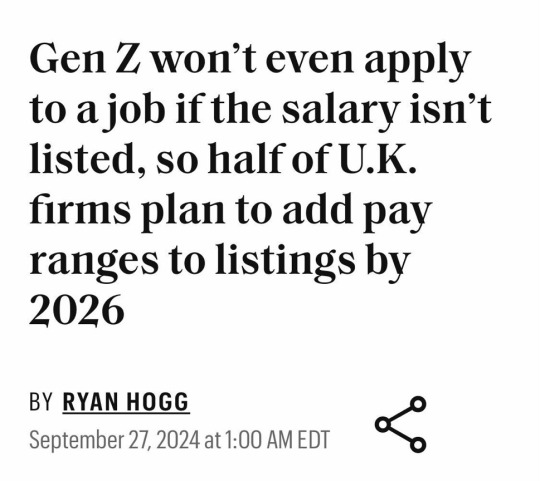

Source
Good
#capitalism#government#economic inequality#the left#progressive#gen z#working class#twitter post#current events#eat the rich#end capitalism#news#socioeconomic inequality#workers rights
37K notes
·
View notes
Text

We respect all types of work boots in this house. Like to charge, reblog to cast
#workers of the world unite#workers rights#construction workers#sex worker#blue collar worker#adult work#work#work from home#work anywhere#work anywhere do anything#workers rise up#union strong
32K notes
·
View notes
Text
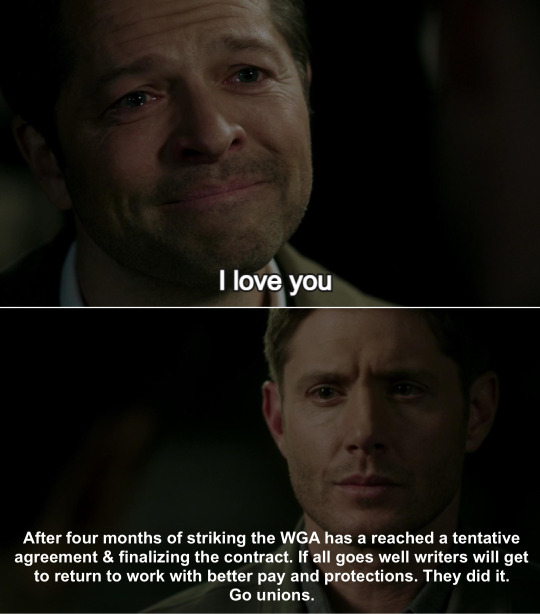
I’m so happy for them
[Image Description: Castiel from Supernatural is saying I love you, underneath is an image of Dean Winchester with the caption: “After four months of striking the WGA has a reached a tentative agreement & finalizing the contract. If all goes well writers will get to return to work with better pay and protections. They did it. Go unions”]
(Source)
#wga solidarity#wga strong#after months of watching union busting and anti union tactics#wga is coming out strong#hopefully sag is next!#writers strike#support unions#wga strike#sag strike#supernatural meme#destiel#destiel meme#workers rights#fuck the amptp#destiel news#mine#we’ve hit the note amount where people start fighting in the notes#stop fighting kids#but also the strike was absolutely necessary#withholding labor is how unions negotiate for better rights#the CEOs are multimillionaires who refused to pay proper wages#they needed to receive heavy losses so they’d actually come to the table listen to union demands
74K notes
·
View notes
Text
I fucking hate this "capitalism is when you make money, the more money you make, the more capitalism it is" mindset people have gotten. No, an artist selling their own work is not them engaging in capitalism, it's literally a worker owning their own means of production.
Remember capitalism is someone profiting off of someone else's labor though owning capital. It is not simply the act of profiting at all.
#196#my thougts#leftist#leftism#anticapitalist#anti capitalism#anti capitalist#anticapitalism#communist#communism#workers rights#worker solidarity#artists on tumblr#art#capitalism#marxism#marxist
18K notes
·
View notes
Text
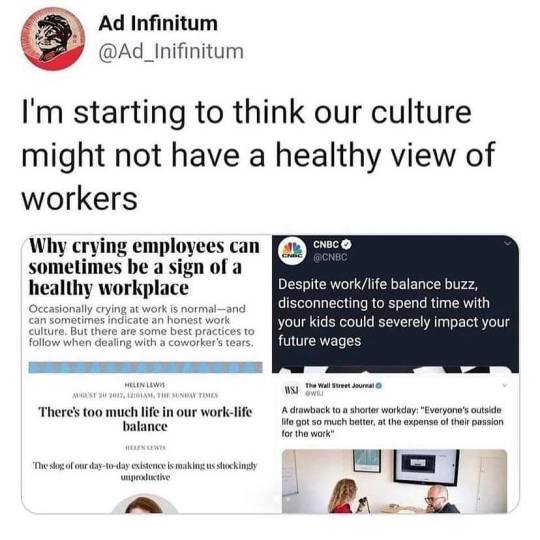
37K notes
·
View notes
Video
tumblr
join a union
the power of collection action
#tiktok#Adam Conover#collective action#union workers#labor unions#unions#protest#labor vs capital#labor rights#capital vs labor#labor movements#labor movement#workers rights#workers vs capital#workers#writers strike
37K notes
·
View notes
Text
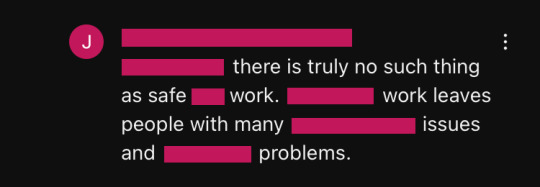
work leaves people with many issues and problems.
2K notes
·
View notes
Text

Put not your faith in princes. Labor is where the power is.
#labor rights#workers rights#department of labor#fuck doge#fuck musk#fuck trump#christofascists#labor unions
2K notes
·
View notes
Text
I see a lot of people talking about how great it would be for sex workers to unionize, so I want to point out that in the UK we have done so already!
We need to get the word out to sex workers in the UK who don't already know about the union, so sharing is appreciated particularly if you're a sex worker or you're in the UK and might have UK sex worker followers.

SWU is a branch of sex workers, in the UK, organising with BAFWU for better working conditions and fighting to change the industry from within.
We fight for ‘Worker’ status sex workers (strippers, full-service sex workers and more) basic worker protections while allowing them to retain the label of self-employed and the associated freedoms. We seek to improve conditions through collective negotiation and individual casework. We organise to claim basic rights at work, such as annual leave, sick pay, a guaranteed basic wage for those working at venues, and the right to organise and be represented by a trade union.
This union has been immensely valuable to me. It gives us access to other sex workers who we can get safety advice from, a huge number of resources, and the ability to push for changes to the policies of escorting websites or strip clubs or porn sites.
You can learn more on SWU's website here and join the union!
Membership to the union costs roughly £6 per month and for me personally, from help with taxes and support getting money back from clients who've refused to pay me, the union has saved me far more money than I've spend on union dues.
1K notes
·
View notes
Text

Source

Source
73K notes
·
View notes
Text
Federal regulators on Tuesday [April 23, 2024] enacted a nationwide ban on new noncompete agreements, which keep millions of Americans — from minimum-wage earners to CEOs — from switching jobs within their industries.
The Federal Trade Commission on Tuesday afternoon voted 3-to-2 to approve the new rule, which will ban noncompetes for all workers when the regulations take effect in 120 days [So, the ban starts in early September, 2024!]. For senior executives, existing noncompetes can remain in force. For all other employees, existing noncompetes are not enforceable.
[That's right: if you're currently under a noncompete agreement, it's completely invalid as of September 2024! You're free!!]
The antitrust and consumer protection agency heard from thousands of people who said they had been harmed by noncompetes, illustrating how the agreements are "robbing people of their economic liberty," FTC Chair Lina Khan said.
The FTC commissioners voted along party lines, with its two Republicans arguing the agency lacked the jurisdiction to enact the rule and that such moves should be made in Congress...
Why it matters
The new rule could impact tens of millions of workers, said Heidi Shierholz, a labor economist and president of the Economic Policy Institute, a left-leaning think tank.
"For nonunion workers, the only leverage they have is their ability to quit their job," Shierholz told CBS MoneyWatch. "Noncompetes don't just stop you from taking a job — they stop you from starting your own business."
Since proposing the new rule, the FTC has received more than 26,000 public comments on the regulations. The final rule adopted "would generally prevent most employers from using noncompete clauses," the FTC said in a statement.
The agency's action comes more than two years after President Biden directed the agency to "curtail the unfair use" of noncompetes, under which employees effectively sign away future work opportunities in their industry as a condition of keeping their current job. The president's executive order urged the FTC to target such labor restrictions and others that improperly constrain employees from seeking work.
"The freedom to change jobs is core to economic liberty and to a competitive, thriving economy," Khan said in a statement making the case for axing noncompetes. "Noncompetes block workers from freely switching jobs, depriving them of higher wages and better working conditions, and depriving businesses of a talent pool that they need to build and expand."
Real-life consequences
In laying out its rationale for banishing noncompetes from the labor landscape, the FTC offered real-life examples of how the agreements can hurt workers.
In one case, a single father earned about $11 an hour as a security guard for a Florida firm, but resigned a few weeks after taking the job when his child care fell through. Months later, he took a job as a security guard at a bank, making nearly $15 an hour. But the bank terminated his employment after receiving a letter from the man's prior employer stating he had signed a two-year noncompete.
In another example, a factory manager at a textile company saw his paycheck dry up after the 2008 financial crisis. A rival textile company offered him a better job and a big raise, but his noncompete blocked him from taking it, according to the FTC. A subsequent legal battle took three years, wiping out his savings.
-via CBS Moneywatch, April 24, 2024
--
Note:
A lot of people think that noncompete agreements are only a white-collar issue, but they absolutely affect blue-collar workers too, as you can see from the security guard anecdote.
In fact, one in six food and service workers are bound by noncompete agreements. That's right - one in six food workers can't leave Burger King to work for Wendy's [hypothetical example], in the name of "trade secrets." (x, x, x)
Noncompete agreements also restrict workers in industries from tech and video games to neighborhood yoga studios. "The White House estimates that tens of millions of workers are subject to noncompete agreements, even in states like California where they're banned." (x, x, x)
The FTC estimates that the ban will lead to "the creation of 8,500 new businesses annually, an average annual pay increase of $524 for workers, lower health care costs, and as many as 29,000 more patents each year for the next decade." (x)
Clearer explanation of noncompete agreements below the cut.
Noncompete agreements can restrict workers from leaving for a better job or starting their own business.
Noncompetes often effectively coerce workers into staying in jobs they want to leave, and even force them to leave a profession or relocate.
Noncompetes can prevent workers from accepting higher-paying jobs, and even curtail the pay of workers not subject to them directly.
Of the more than 26,000 comments received by the FTC, more than 25,000 supported banning noncompetes.
#seriously cannot emphasize enough that this is going to be a huge deal for so so many people#it could seriously drag up wages in food and service industries in particular#especially in the long run#and also massively reshape tech and video game industries#do you have any idea how many game devs are legally not allowed to start their own studios? probably most of them#and that's about to change for the better!!#ftc#noncompete#united states#us politics#business#business news#biden administration#voting matters#democrats#federal trade commission#video game industry#game devs#fast food#fast food workers#labor#labor rights#workers rights#blue collar#service workers#good news#hope
3K notes
·
View notes
Text
I keep seeing posts talking about the WGA/Sag-Aftra strike, which yes, good, but in all this "support writers" sentiment I'm seeing no one talk about book writers, which I think is something people should know more about right now.
We are at an all-time high for book bans, namely targeting queer & PoC-authored books. This means that a lot of schools and libraries are no longer stocking diverse YA books, and if you're not in publishing, you may not realize this but school & libraries are by far one of the biggest markets for diverse YA books.
This means that in 2023, YA book sales are down. This is also in part because Barnes & Noble (the largest physical book retailer in the U.S.) is no longer really stocking YA hardcovers. This means that marginalized authors and debut authors are struggling to sell books.
But it's a LOT worse than that. In the past couple of years, marginalized authors are *really* struggling to get new book deals. Most books are acquired by a publisher about 2 years before they release to the public, so this isn't all that noticeable yet, but a LOT of marginalized authors I've spoken to (myself included) have been unable to sell a new YA book since 2020. So while I had a book out last year, even if I sell one right now, you won't see it until 2025-2026. That's three to four years without a new release or the income I get from publishing those books.
On top of that, Big 5 publishers have started closing imprints (namely their diverse imprints) and have started telling their marginalized YA authors to just go. I've had multiple authors tell me their publisher basically said, "eh, we don't care to put in the work for you anymore. You can just go somewhere else". Of the authors who *are* getting offered new contracts, we're being offered pay far below the cost of living and we're being handed contracts that split our payments 4 or 5 ways and require we sign over our work to be used to train AI so they can replace us a few years down the road.
Authors are freelancers who own our IPs, which means we can't unionize the way Hollywood writers can, and despite authors showing up in droves to support HarperCollins employees when they went on strike for fair wages, we're being hung out to dry when it comes to our own rights.
If you enjoy diverse books, especially diverse YA, please understand that many of the authors you loved over the past 3-5 years are being forced out of the industry. We're being exploited, and we have no way to defend ourselves. Our books sales are drying up thanks to anti-queer legislation, our rights are being eaten up by AI, and our publishers are degrading us while profiting of us and refusing to share those profits with us.
Within the publishing industry, we've all been watching this decline happen over the last decade, but outside of it, I know most people have no idea what's going on so please spread the word. And if you care about diverse books especially in YA, please support marginalized authors in any way you can. The industry needs to be reminded that it needs us before we're all eliminated from it.
#Books#diverse books#author#publishing#sag aftra#writers strike#writers#labor rights#workers rights#wga strike
7K notes
·
View notes
